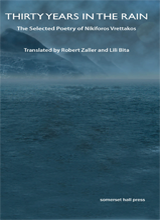Lili Bita and Robert Zaller – Thirty Years in the Rain: The Selected Poetry of Nikiforos Vrettakos. Reviewed By Dave Bonta
(Via Negativa, Posted on April 4, 2012, http://www.vianegativa.us/2012/04/thirty-years-in-the-rain-nikiforos-vrettakos-as-translated-by-robert-zaller-and-lili-bita/)
Diamond-like and deceptively simple: that’s how Rachel described the dozen or so poems I had time to read to her from this book today. I concur. These poems combine the plain-spoken lyricism of, say, José Martí’s Versos Sencillos, the fierce affirmation of Jorge Guillén’s Cántico and the pellucid quality and light-drenched landscapes of Eugénio de Andrade’s best work.
Now, you may be saying to yourself, “Who the hell are Eugénio de Andrade and Jorge Guillen?” If so, you’re hardly alone: poetry in translation is an extremely minor concern of American publishers, and few Anglophone poetry fans seem aware of much beyond our own linguistic borders, save for a few luminaries such as Neruda, Rilke and Lorca. That’s a shame, because Greece alone has produced many great poets this past century: C.P. Cavafy, George Seferis, Yannis Ritsos, Angelos Sikelianos, and Odysseas Elytis all deserve a place on any poetry-lover’s shelf. Add to that roster Nikiforos Vrettakos, a member of the “Generation of the 30s” evidently as revered in Greece as any of the others I’ve just listed, but unknown here until Robert Zaller and Lili Bita began to collaborate on the English translations collected in Thirty Years in the Rain. I hadn’t heard of him myself until just last month, when I happened on this blog post:
January 1st marked the centenary of the birth of the Laconian poet, fiction writer, essayist, translator, Athens Academy member, and Nobel Prize Nominee, Nikiforos Vrettakos. Therefore the Hellenic Ministry of Culture and Tourism has declared 2012 as the Year of Nikiforos Vrettakos.
Since he didn’t win a Nobel Prize for Literature like his two contemporaries Odysseas Elytis and George Seferis, Nikiforos Vrettakos is less-known abroad. In Greece though, he is a poetry giant, taught in schools, and many of his poems are set into music. People go back to his poetry for “his tenderness and boundless humanism”.
Working my way through Thirty Years in the Rain, I found many things to admire. Vrettakos returns again and again to the rugged massif of his childhood, the storied Taygetos. As a nearly life-long dweller in the considerably less rugged Appalachians, naturally I appreciated this kind of imagery. His most direct treatment comes in “Stone Petals”:
“Taygetos isn’t a mountain.” I didn’t
discover it, but found it beside me
when I was born. It stood by. Later
I dreamt of it as a kind of church—
at the center of the earth.
Its bells chiming, scattering
petals over the nations.
This short poem also demonstrates two other things I liked about the book: Vrettakos seems very comfortable with religion as a repository of mystery and wonder (without necessarily being a believer himself, I gather), and his poetry betrays a certain attraction to the via negativa — which wouldn’t be at all surprising for someone from the Eastern Orthodox homeland. This latter tendency expresses itself in his nuanced appreciation for darkness and silence, which is all the more striking for its contrast with his general heliotropism. Take for instance “Liberation”:
My soul dances today, winged,
looking to alight on a branch
of light, to hear, see, say
whatever can be heard, seen, said.
It’s good to know, and know well,
that the thing you are
was hatched out of darkness.
As for silence, he imagines in one poem, “Beside the Others,” an entire “volume of silence” among his collected works. (Vrettakos was apparently a very prolific author.)
In it is everything I hid
and everything within me that
hadn’t had time for the long journey to the light.
The pages are huge, too heavy
to lift. No one will read it.
God will take it as it is
and put it in his heavenly library.
Nor is silence without its perils:
If silence spoke,
erupted, exploded—it would level
every tree in the standing world.
(“Chorale”)
And in “Inexplicable,” the eyes of an unnamed beloved contain “A silence / filled with what can and can’t / be deciphered.”
Vrettakos was a leftist, like most Greek intellectuals of his generation, but departed from the party line on many issues. I particularly appreciated the poems on peace, which he often seemed to equate with poetry as a natural impulse of all life:
I’m immersed in each brook on whose flow
the word Peace runs like a psalm.
(Because the waters are a thinking sun).
(“Address to a Peace Conference”)
But his apophatic instincts led him to decry the fetishization of peace, too:
All that’s left of peace
is an empty word, a shed garment.
It’s scrawled everywhere, as if
to mock its own countenance:
the divine plenitude, the sap that flows
from flower to flower, the poetry.
Yet still I wouldn’t want
to find it among my own pages,
like a white corpse in a casket.
(“The Empty Word”)
Vrettakos himself describes his work best: he is an overflowing cistern whose waters come “half from / earth’s grief, the rest from its miracle” (“Cistern”). Toward the end of his life, he wrote:
I’ve said my piece,
it’s enough to know that
here and there, now and then,
I’ve added my song to the birds’.
(“All I’ve Said”)
I think I want to be Nikiforos Vrettakos when I grow up.

